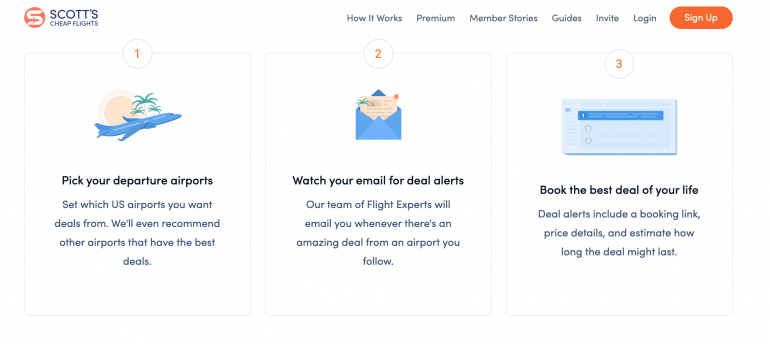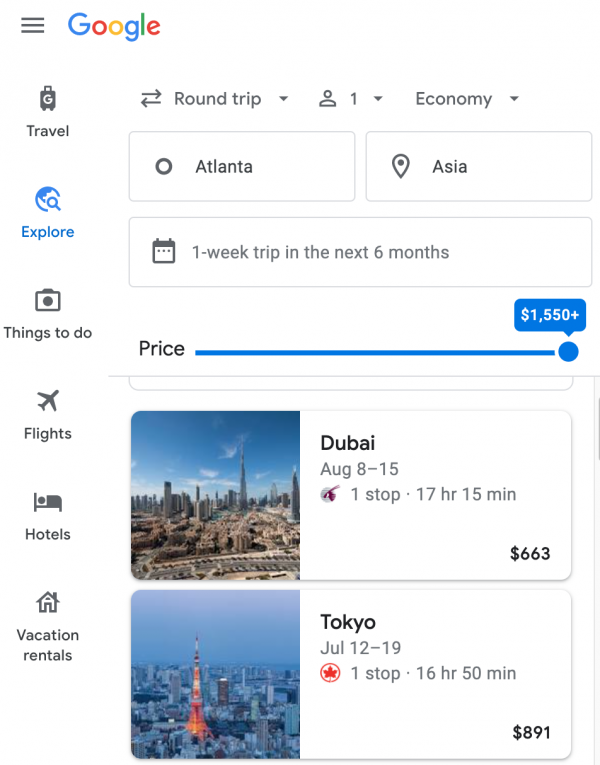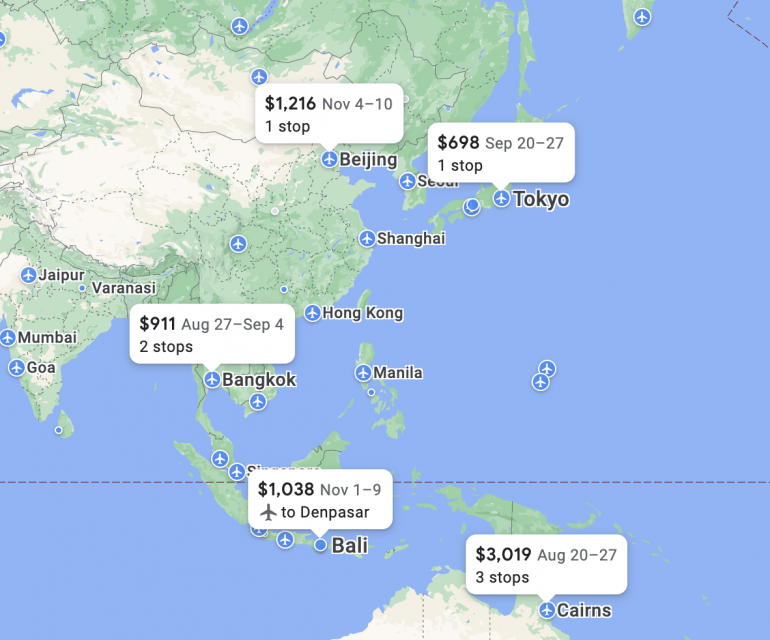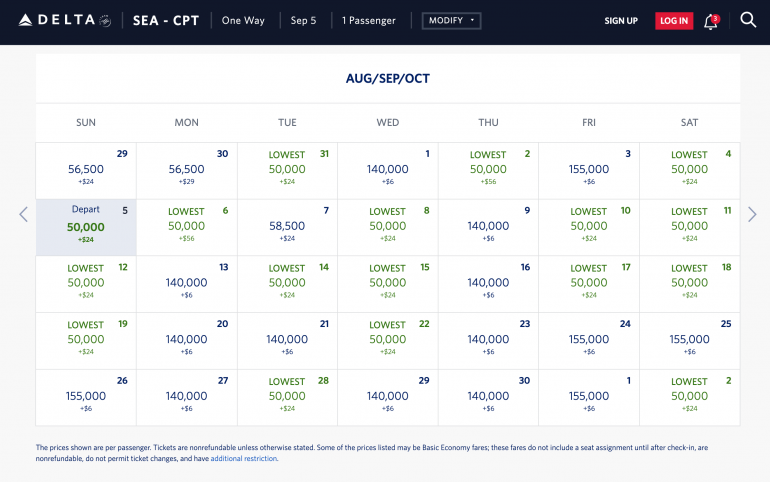There’s Just One Trick to Traveling Cheaply: Flexibility
To fly for the lowest price, you should try searching without a specific destination or date in mind.

Many or all of the products on this page are from partners who compensate us when you click to or take an action on their website, but this does not influence our evaluations or ratings. Our opinions are our own.
So you want to travel on a budget. Who doesn’t? Yet it’s easy to get overwhelmed by all the cheap travel tips, hacks and strategies out there that promise unbelievable deals on airfare and hotels.
In reality, there’s only one important tactic for traveling cheaply: being flexible with your travel dates, destination and plans. It might sound simple — or even simplistic — but you would be surprised how few travelers are willing to take this piece of advice to heart.
To be fair, this flexibility-first mindset requires a paradigm shift for many in terms of how they start planning vacations. It requires moving from this type of planning:
“I want to go to Amsterdam from Sept. 5 through 13.”
To this:
“I want to go somewhere fun in September.”
For some, this degree of flexibility is simply impossible. Navigating travel planning between work, family and other constraints requires specific dates and plans. Yet for those who can loosen their preconceptions about how to plan travel, it can lead to big savings — and maybe even more fun.
This approach is useful whether you’re paying with cash or using miles, and even for all of the price ranges, from budget to luxury.

Why rigidity is so expensive
The cost of travel depends on the interplay between many factors, including:
- Demand.
- Supply.
- Randomness.
- Number of options.
When you make specific plans from the get-go, you essentially constrain the last variable — you give yourself fewer options. This means that the cost of your trip will depend entirely on the first three variables, which are completely outside of your control.
This economic interplay will sometimes fall in your favor, and you’ll score a good deal on the exact destination and dates you wanted. But more often than not, you’ll end up paying more than average simply by starting with a severely limited set of options.
How to plan travels with flexibility
You might be asking yourself, “How am I supposed to start planning travel if I have to keep everything up in the air?” While a fair question, it misses an essential component: You can still set some boundaries around your search.
Example parameters might include:
- I want to travel in the fall.
- I want to sit on the beach.
- I don’t want to spend more than $X.
From here, you can begin weighing different destinations and dates to see which could maximize your preferences. For example, you might start with flights to Hawaii, but notice that airfare is through the roof. So you switch to the Caribbean, narrow your interest to a few destinations with cheap flights and then start researching hotel prices.
Finally, you can find the dates and destinations that offer the best combination of price and features, then book your travel.
This might sound remedial, but think about how many times you (or someone you know) have gone about it the other way — by starting with dates and a destination, then accepting whatever costs come up.

By signing up, you will receive newsletters and promotional content and agree to our Terms of Use and acknowledge the data practices in our Privacy Policy. You may unsubscribe at any time.
The right tools for the job
As this flexible travel approach gains in popularity, travel booking sites and services have begun offering helpful tools specifically designed for the task.
Airfare deal alerts
Airfare deal newsletters, like Scott’s Cheap Flights and Dollar Flight Club, are how many travelers start thinking in terms of flexibility. These newsletters and alert services send a blast to subscribers whenever they discover a low-cost airfare deal.

But there’s usually a catch: These airfare deals are available only on certain dates, or to very specific (sometimes random-feeling) destinations. You can’t sit around waiting for a great deal from Atlanta to Sydney, because that may not come around in time.
But you can wait for an exciting fare from Atlanta to … somewhere, and jump on it when it becomes available.
Google Flights Explore
Many travel search engines, like Kayak or Orbitz, have highly flexible search tools.
But Google Flights takes it a step further than the travel sites that let you search for flexible dates. It offers a feature that is specifically targeted to even more flexible travel. It’s called “Explore” and it allows you to search in a totally wide-open way.

To use the tool, enter your departure city, the length of trip you’re looking for and your price range, and Google returns a handful of great deals to a bunch of destinations at random times within your date range.

Compared with a deal alert service, the drawback is that the available deals displayed depend on when you conduct your search. You might just miss a great deal on Tuesday if you do your search on Monday, for example, but it’s a great way to consider many exciting options at once.
Points and miles
Travel bloggers love to rave about how they scored a first-class ticket to Japan using miles, but they don’t often describe their true secret: extreme flexibility.
Redeeming points and miles for reward travel all but requires a high degree of flexibility to get the most value from them. For one thing, the availability of these flights and rooms can be very spotty. Before you can even determine if an award booking is a good deal or not, you need to actually find an available award booking option.
For another, airlines often double the price or more during high-demand dates.
In short: If you’re looking to use miles on a specific flight on a specific day, you might either pay too much — or not be able to score a ticket at all.
That’s where flexibility comes in. To make things easier, many airlines offer award calendars that let you see which dates and prices are available by month, which can be especially helpful when rooting out hard-to-find premium cabin tickets.

Stretch yourself
If you’ve always wondered why other people can find great travel deals while you invariably pay out the nose, now you know why. Being flexible with your travel plans is the best way to knock down the cost of travel, period.
What’s more: It can be a lot of fun. Rather than planning exactly where you want to go and when, you can let the deals inform your next vacation. This openness can help you travel to places and have experiences that you never would have otherwise. It doesn’t mean you have to book travel last minute or scrap planning altogether. It just means letting go of two variables — the when and the where — and seeing what comes up.
If it doesn’t work out, you can always book travel the old-fashioned way.
Article sources
NerdWallet writers are subject matter authorities who use primary,
trustworthy sources to inform their work, including peer-reviewed
studies, government websites, academic research and interviews with
industry experts. All content is fact-checked for accuracy, timeliness
and relevance. You can learn more about NerdWallet's high
standards for journalism by reading our
editorial guidelines.
Limited Time Only: Earn $1,000 Toward Travel!
Capital One Venture Rewards Credit Card 
Travel

For a limited time, the
Capital One Venture Rewards Credit Card is offering new cardholders an especially rich bonus: Enjoy $250 to use on Capital One Travel in your first cardholder year, plus earn 75,000 bonus miles once you spend $4,000 on purchases within the first 3 months from account opening - that’s equal to $1,000 in travel!
More like this
Related articles








